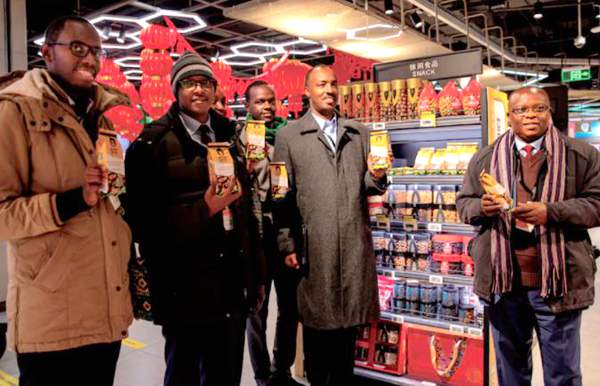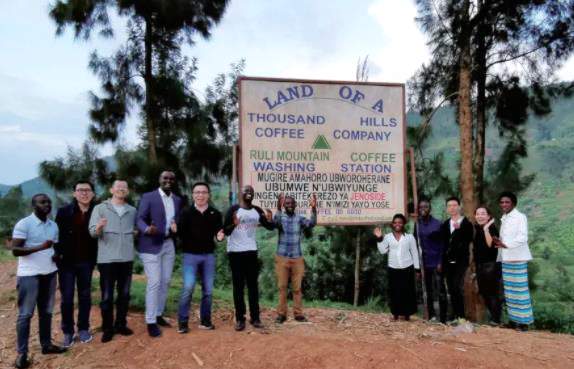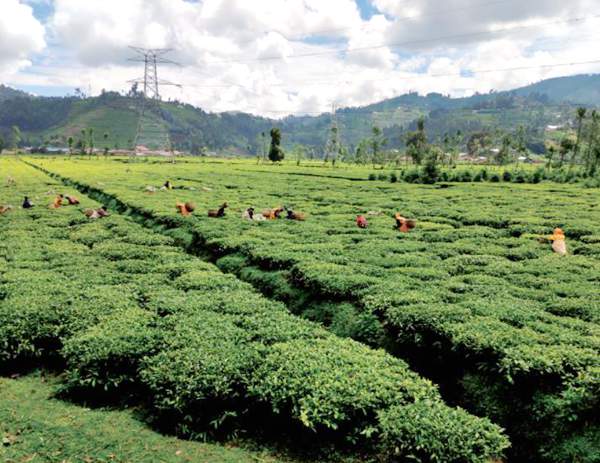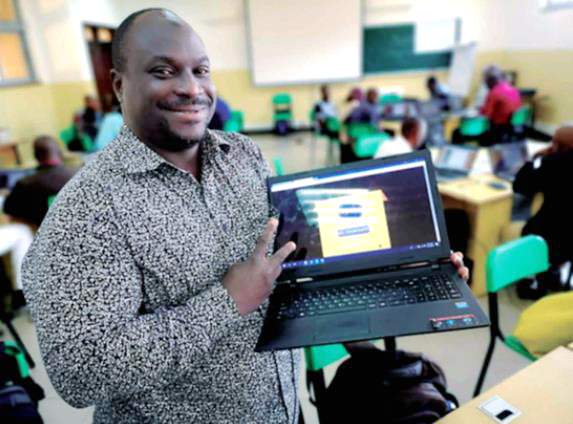New E-Commerce Platforms in Rwanda
by Zhang Yuwen
[Rwanda] Samuel Abikunda
Rwanda in central eastern Africa, blessed with mountains, rivers and beautiful scenery, is known as the "land of a thousand hills". A famous summer resort in Africa, it has pristine rainforests, vast plains and active volcanoes, which have given rise to an ecosystem with amazing biodiversity and a variety of wildlife. Tourists also flock to Rwanda to see one of its national treasures – the mountain gorilla.

On the way from Kigali, the capital of the country some 1,700 m above sea level, to the mountain chains in the north, you can see the Nyabarongo River, a major river and part of the headwaters of the upper Nile, winding through the mountain ridge. This area, dotted with coffee plantations, large and small, has given birth to a coffee brand – Gorilla's Coffee, named after the national treasure of Rwanda.
Selling Coffee to China
With its volcanic soil and stable rainfall, Rwanda has a unique environment for coffee planting, and most of the coffee shrubs are grown in high mountains at an altitude of ,700-2,000 m above sea level.

"Gorilla" coffee is sold to China.
Driving toward the coffee plantations in the mountains, you can see the asphalt road dwindling into a narrow and uneven dirt road. The bracing air is redolent with the aroma of coffee beans.
Many villagers here have been planting coffee for three or four generations. There are about 400,000 coffee farmers in Rwanda and coffee is the pillar of their family economy. In the past, due to the absence of technology and equipment for producing high-quality coffee beans, the quality of the beans was low for a long time while the lack of good international trade channels and bargaining power made their price low as well.
In March, the green coffee fruits begin to turn a ripe yellow and then red, and the farmers know it is harvest time.
It's a hectic time for Didion. His small coffee plantation is the only source of income for his family of four. From picking the fruits to washing them, hulling, fermenting and drying, the entire process of transforming the fruits into quality coffee beans takes nearly a month. But despite the painstaking efforts, Rwanda farmers who export green coffee earned little for a long time.
Then one day, Didion heard a group of Chinese had arrived in the village and were talking of selling the local coffee to Chinese buyers on the Internet. However, he did not take the news seriously. After all, China was such a distant country that it was hard to believe that people there would travel thousands of miles to buy coffee beans in Rwanda.
But unexpectedly, in October 2018, Alibaba, a Chinese e-commerce company, began to sell the coffee produced in Rwanda to China. Chinese consumers could buy high-quality Bourbon or Arabica coffee beans directly from Rwanda.

Chinese and Rwandan staff take a group photo in front of a coffee garden.
All the coffee was sold out on the first day.
In the next three months, Rwandan coffee brands sold more than 2,000 packets of coffee beans to Chinese buyers on Alibaba's e-commerce platform. Since then, the demand has been increasing, and other Chinese companies have also begun to order large volumes from Rwandan coffee producers. Many Chinese who visit Rwanda are also making special trips to local coffee factories.
In addition to better sales, the prices have gone up, too. Chinese e-commerce platforms sell locally processed and packaged high-quality finished coffee to Chinese consumers, giving more added value to Rwandan coffee growers. The new e-commerce channel has dispensed with the need for tedious intermediaries and brought Rwandan coffee farmers and other people in the industry tangible benefits: every kilogram of coffee sold online can make USD4 more than before.
"The help that China's e-commerce platforms have given us is really tangible," said Diane Sayinzoga, a division manager with the Rwanda Development Board.
Welcome to Digital Rwanda
Rwanda, with its abundance of mountains and lakes, has a different landscape from its neighboring countries. This is undoubtedly a unique tourism resource. Combined with the rich wildlife and historical and cultural heritages, it has made the country a leading tourist destination in the region.
The Nyungwe Forest National Park, Africa's largest mountain rainforest, spans the mountains in southeastern Rwanda. It has the largest alpine forests in East and Central Africa, and is rich in wild animals and plants.
In the Akagera National Park, a protected wetland with magnificent mountains and beautiful savannahs, you can see the "Big Five" – the African lion, African elephant, African buffalo, African leopard and black rhino.
Kigali is the first city on the African continent to receive the UN's World Habitat Award given in recognition of achievements in housing development. Here you can learn about Rwanda's past and see Rwanda's promising future.
But Rwanda's abundant tourism resources were not fully tapped.
Anita is a Rwandan travel agency owner born in the 1980s. She knows how beautiful and fascinating her country is, and is confident that if tourists come here from other parts of the world, they would be impressed by its unique beauty and charm.
However, although she set up a website for her agency, meticulously designed routes, adjusted her agency's services from time to time and communicated with potential customers enthusiastically, the results did not meet her expectations, leaving her anxious.
"Someone advised me to try online marketing but I continued to communicate offline with my customers," she said. "I also did my transactions offline as I didn't think people faraway would make the payments as agreed on." Most of the time, Anita would rather use the traditional means of transactions and settle for fewer orders since she thought this was the only reliable way.
However, once she learned of Fliggy, the online tourism platform of Alibaba, in 2018 and began using the business model, she changed her mind dramatically. Now, she is trying to integrate resources through the Internet and collaborate with various partners to enter the Chinese market. She has found that not only has her work become easier, but more people have begun to buy her travel services.

A glimpse of Rwanda
"At first, I just saw it as an online store, but later I realized that there was still a lot to learn," she said, adding emotionally, "I'm grateful to China because it has introduced the concept of smart tourism in Rwanda."
In 2018, the Visit Rwanda tourism initiative was launched. This is not only an online platform showcasing Rwanda's local customs, but also opens up vast space for direct communication between Rwanda and global consumers.
Online travel sales have produced amazing results and the number of tourists visiting Rwanda has grown rapidly. Inspired by this, RwandAir, Rwanda's flag carrier airline, started flying from Kigali to Guangzhou in south China, while Fliggy has special recommendations and promotions for this route on its homepage. Thanks to technology, more and more travelers from all over the world can visit Rwanda in the future.
In October 2018, Alibaba and the Rwandan government signed three cooperation agreements on overall cooperation, digital tourism and digital talent training to jointly build the first electronic world trade platform (eWTP) in Africa. In this way, Rwanda has begun its digital development.
A Flourishing Digital Economy
Haguma is a China-Africa trade consultant and entrepreneur who has contributed to Rwanda's development in his own way.
In Rwanda, transferring money used to be expensive and time-consuming. People had to either travel to post offices in towns to transfer money or do it via their mobile phones, which meant they would have to pay a high transaction fee. Farmers without any credit record could not get loans to buy seeds and fertilizers.
Haguma thought the situation needed urgent change.
In April 2019, he participated in the eFounders Fellowship program organized by the Alibaba Business School for Rwandan entrepreneurs, and learned novel business concepts together with 30 Rwandan entrepreneurs, who were doing business in e-commerce, logistics, big data, tourism and some traditional industries. The program focused on contents to meet local needs, such as rural online shopping, cross-border e-commerce, and the transformation of traditional enterprises.

A Rwandan man in an e-commerce training class
After the short-term training at the business school, the quick-thinking Haguma came up with new ideas.
Soon after leaving the business school, he initiated an e-wallet project. Drawing on the model of Alipay, Alibaba's third-party mobile and online payment platform, he built a credit score system based on Rwandan farmers' production and consumption data to help them get funds more quickly. "In the past, I relied on large financial companies to make changes. Now I realize that we ourselves can bring in more profound changes," he said.
Similar training programs are available for government departments, too. The training has given Rwandan government officials more skills to implement a digital economy that will help reduce the urban-rural economic gap and improve the overall development of the economy.
Rwandan President Paul Kagame has stressed the importance of the eWTP, saying it will open a new frontier for e-commerce and tourism in Rwanda, and will also improve the competitiveness of domestic enterprises.
In 2019, 20 Rwandan young people, selected through a tough procedure, flew to China and became the first Rwandan undergraduates to major in cross-border e-commerce at the Alibaba Business School.
With the rise of the digital economy, they will help present Rwanda and its potential to the world in new innovative ways.
FOR MORE
Project Overview:
In October 2018, Alibaba and the Rwandan government signed three cooperation agreements on overall cooperation, digital tourism, and IT training to jointly build Africa's first pilot eWTP. Alibaba has provided training for Rwandan government officials, entrepreneurs and university teachers. It offers opportunities for Rwandan specialty products to enter the Chinese market through e-commerce platforms and self-run models, and has collaborated with the Rwanda Development Board to launch the Visit Rwanda website on Fliggy at the end of 2018, introducing Rwanda's folk customs, business opportunities and quality tourism products to Chinese consumers.


